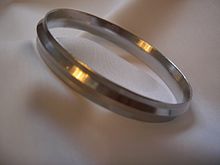Kara (Sikhism)

| Part of a series on |
| Sikhism |
|---|
 |
A kara (
History
The kara was instituted by the tenth
He does not recognize anyone else except me, not even the bestowal of charities, the performance of merciful acts, austerities, and restraint on pilgrim-stations; the perfect light of the Lord illuminates his heart, then consider him as the immaculate Khalsa.
— Guru Gobind Singh[2]
Meaning and usage
Theology
The Kara is a symbol of unbreakable attachment and commitment to God. As the Sikhs'
Combat
It was also historically used like a
Controversies
India
In 2022, a Sikh lady candidate, Manharleen Kaur was barred from taking a competitive examination by the Delhi Subordinate Services Selection Board (DSSSB) until she removed her metallic Kara, despite arriving at the examination site before the closing time.[6] Kaur later filled a case against DSSSB in Delhi High Court for the denial of permission to her to appear in examination. DSSSB informed court that "Sikh candidates are allowed to appear in examinations with metallic kara (bangle) or kirpan (dagger) subject to their reaching the centre at least one hour before the reporting time" and a notice was sent to Kaur informing the above guidelines but Kaur argued that "such notification was notified only two days after the examination was held." After hearing the petitioner, the court directed DSSSB "to ensure that adequate notice, which is well in advance, is given concerning the additional requirement to reach the examination centre one hour before the reporting time in case a candidate is wearing a kara and/or kirpan so that no undue hardship is caused to them."[7]
United Kingdom
In November 2007, a 14 year old Sikh girl, Sarika Singh was excluded from
In 2017, 8 year old Kaiden Singh was banned from wearing a kara to school in Tipton, England.[10]
See also
References
- BBC.co.uk. BBC Online. 29 September 2009. Archivedfrom the original on 16 January 2024. Retrieved 19 February 2024.
- ^ Guru Gobind Singh. Dasam Granth. p. 1350.
- ^ Guru Granth Sahib. p. 76.
- ^ Kabir. Guru Granth Sahib. p. 1376.
- ISBN 9780520928671. Archivedfrom the original on 19 February 2024. Retrieved 17 December 2011.
Individual Sikhs and Hindus share symbols and practices of body inscription (such as wearing a kara and women keeping their hair long).
- ^ "Sikhs wearing kara/kirpan to be allowed to take DSSSB exam if they reach 1 hr before time, HC told". The Economic Times. Press Trust of India. 7 October 2022. Archived from the original on 2024-02-20. Retrieved 2024-02-20.
- Telegraph India. Press Trust of India. 12 July 2022. Archivedfrom the original on 2022-07-14. Retrieved 2024-02-20.
- ^ MacLeod, Donald (23 January 2008). "Excluded Sikh pupil goes to court over religious bangle ban". The Guardian. Archived from the original on 9 March 2020. Retrieved 19 February 2024.
- ^ "UK: Sikh girls wins legal battle". Rediff.com. Press Trust of India. 29 July 2008. Archived from the original on 6 August 2008. Retrieved 19 February 2024.
- NDTV.com. Press Trust of India. 3 October 2017. Archivedfrom the original on 12 August 2019. Retrieved 19 February 2024.
